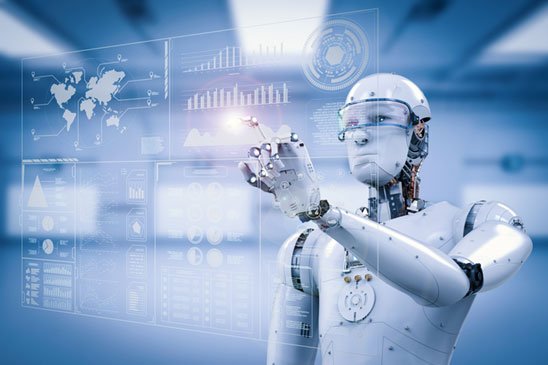What is Artificial Intelligence? Where it is Useful?
What is Artificial Intelligence? Where it is Useful?
Artificial Intelligence (AI) is a rapidly growing field that has revolutionized the way we think about technology and its potential impact on society. In this blog post, we will explore what AI is, how it works, and the various applications it has in different industries.

What is Artificial Intelligence?
Artificial Intelligence refers to the development of intelligent machines that can perform tasks that typically require human intelligence, such as visual perception, speech recognition, decision-making, and language translation. AI is based on the principle of Machine Learning (ML), which involves training machines to learn from data rather than being explicitly programmed.
How does AI work?
AI works by using algorithms and statistical models to analyze large datasets and identify patterns and relationships between variables. These algorithms are designed to learn and improve their accuracy over time, based on the feedback they receive from the data. AI systems can be categorized into two broad categories: Supervised Learning and Unsupervised Learning.
Supervised Learning involves training an AI system with labeled data, where the machine is provided with inputs and expected outputs. The algorithm then uses this data to predict outcomes for new inputs.
Unsupervised Learning, on the other hand, involves training an AI system with unlabeled data, where the machine is given inputs without any predetermined outputs. The algorithm then identifies patterns and relationships within the data to make predictions or recommendations.
Applications of AI:
AI has a wide range of applications in different industries, including healthcare, finance, retail, manufacturing, and transportation. Some of the most common applications of AI include:
- Personalized Marketing: AI can analyze consumer data to create personalized marketing campaigns based on individual preferences and behavior.
- Medical Diagnosis: AI can analyze patient data to identify potential health risks and suggest treatment options.
- Fraud Detection: AI can analyze financial data to detect fraudulent transactions and prevent financial crimes.
- Predictive Maintenance: AI can analyze machine data to predict maintenance needs and prevent equipment breakdowns.
- Autonomous Vehicles: AI can enable self-driving cars to navigate roads and avoid obstacles.
- AI Ethics: As AI continues to advance, there is a growing concern about the ethical implications of using intelligent machines. Many experts worry that AI could be used to reinforce existing biases, violate privacy, or even cause harm to individuals or society as a whole. It’s important to discuss these ethical considerations when writing about AI.
- Natural Language Processing (NLP): NLP is a branch of AI that deals with the interactions between computers and human language. With NLP, machines can understand, interpret, and even generate human language. Some of the most well-known NLP applications include virtual assistants like Siri and Alexa, chatbots, and language translation software.
- Deep Learning: Deep Learning is a subset of Machine Learning that involves using artificial neural networks to learn and make decisions. Deep Learning has been particularly successful in areas such as image and speech recognition, and is widely used in industries such as healthcare, finance, and transportation.
- Limitations of AI: While AI has made significant strides in recent years, there are still some limitations to what intelligent machines can do. For example, AI systems still struggle with tasks that require creativity, empathy, or common sense. It’s important to acknowledge these limitations and discuss the challenges that still need to be overcome in order to fully realize the potential of AI.
- Future of AI: As AI continues to evolve, there is a lot of speculation about what the future of this technology will look like. Some experts predict that AI will become ubiquitous, integrated into every aspect of our lives, while others worry about the potential consequences of this level of integration. It’s important to explore these different perspectives and consider the implications of AI on our society, economy, and culture.
- AI in Healthcare: AI has numerous applications in the healthcare industry, including disease diagnosis and treatment, drug discovery, medical imaging, and patient monitoring. For example, AI-powered systems can analyze medical images such as X-rays and MRI scans to detect abnormalities or help radiologists make more accurate diagnoses. AI can also help doctors identify patients who are at high risk for certain diseases, allowing for earlier intervention and better outcomes.
- AI in Finance: AI is transforming the financial industry, with applications such as fraud detection, risk management, and portfolio management. AI-powered algorithms can analyze large datasets and detect patterns that humans might miss, helping banks and financial institutions make better decisions and mitigate risk. Chatbots powered by AI can also be used to provide personalized financial advice to customers.
- AI in Manufacturing: AI is being used to optimize and streamline manufacturing processes, improving efficiency and reducing costs. For example, AI-powered systems can analyze sensor data from machines to predict when maintenance is needed, helping to prevent breakdowns and downtime. AI can also be used to optimize supply chain management, ensuring that the right products are available at the right time.
- AI in Education: AI has the potential to transform the way we teach and learn. AI-powered systems can personalize learning for individual students, adapting to their pace and style of learning. AI can also be used to grade assignments and provide feedback to students, freeing up teachers to focus on other tasks. In addition, AI can help identify students who are at risk of falling behind, allowing for early intervention and support.
- AI and the Future of Work: As AI continues to advance, there is growing concern about the impact it will have on jobs and the workforce. While AI has the potential to create new jobs and industries, it could also lead to significant disruption and displacement in certain sectors. It’s important to consider the social and economic implications of AI and explore ways to mitigate any negative effects.
- AI and Natural Disaster Response: AI can be used to improve disaster response efforts by analyzing data from sensors and social media to detect patterns and predict where resources are needed most. For example, AI-powered drones can be used to assess damage in hard-to-reach areas, while chatbots can provide real-time updates to affected communities.
- AI and Climate Change: AI can be used to help mitigate the effects of climate change by optimizing energy use, reducing waste, and improving sustainability. For example, AI-powered systems can analyze energy usage data and recommend ways to reduce consumption, while machine learning algorithms can optimize supply chain management to reduce emissions.
- AI and Cybersecurity: AI can be used to improve cybersecurity by analyzing vast amounts of data to detect threats and respond in real-time. AI-powered systems can identify suspicious activity on networks and alert security teams to potential threats, while machine learning algorithms can be used to identify new attack patterns and vulnerabilities.
- AI and Creativity: While AI is often associated with analytical tasks, it can also be used to enhance creativity. For example, AI-powered systems can be used to generate music, art, and even literature. In some cases, AI-generated content has been indistinguishable from human-generated content, raising questions about the role of AI in creative industries.
- AI and Bias: One of the biggest challenges facing AI is the issue of bias. AI algorithms can be trained on biased data, leading to discriminatory outcomes. It’s important to acknowledge this issue and explore ways to mitigate bias in AI systems, such as through diverse training data and algorithmic transparency.
What is Artificial Intelligence?
Answer: Artificial Intelligence refers to the development of intelligent machines that can perform tasks that typically require human intelligence, such as visual perception, speech recognition, decision-making, and language translation.
How does AI work?
Answer: AI works by using algorithms and statistical models to analyze large datasets and identify patterns and relationships between variables. These algorithms are designed to learn and improve their accuracy over time, based on the feedback they receive from the data.
What are some applications of AI?
Answer: AI has numerous applications in different industries, including healthcare, finance, manufacturing, transportation, and education. Some common applications include personalized marketing, medical diagnosis, fraud detection, and autonomous vehicles.
What are the limitations of AI?
Answer: While AI has made significant strides in recent years, there are still some limitations to what intelligent machines can do. For example, AI systems still struggle with tasks that require creativity, empathy, or common sense.
What is the future of AI?
Answer: As AI continues to evolve, there is a lot of speculation about what the future of this technology will look like. Some experts predict that AI will become ubiquitous, integrated into every aspect of our lives, while others worry about the potential consequences of this level of integration.
- Artificial Intelligence applications in healthcare
- How does AI work in finance?
- Limitations of AI in decision-making
- The future of AI in transportation
- AI and personalized marketing strategies
- Natural Language Processing in AI-powered chatbots
- AI and predictive maintenance for manufacturing
- AI and personalized learning in education
- AI and climate change mitigation strategies
- Bias mitigation in AI algorithms
What is Artificial Intelligence? Where it is Useful?



